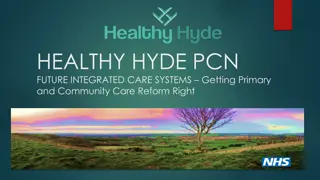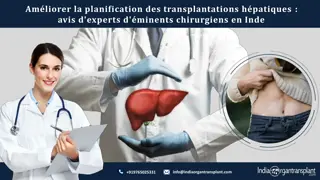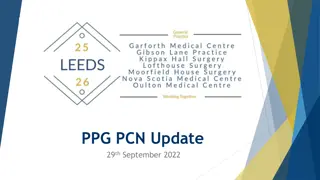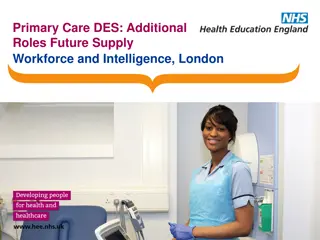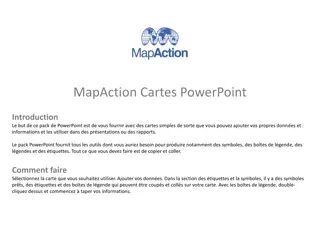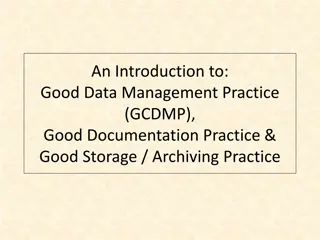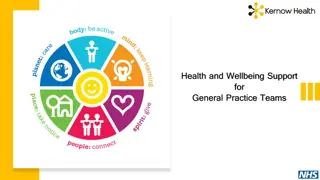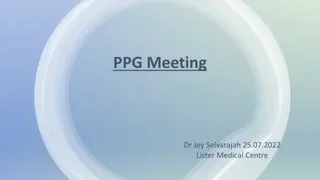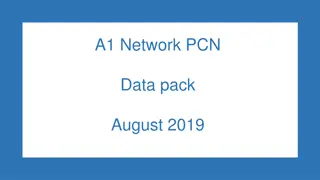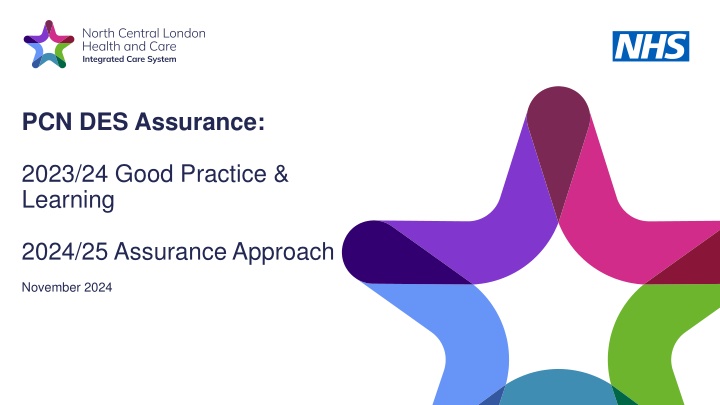
Addressing Health Inequalities: Initiatives by NCL PCNs
Discover how NCL Primary Care Networks are tackling healthcare inequalities through innovative projects like weight management, smoking cessation, and improving access to care for specific communities. Learn about successful initiatives in enhancing health checks, social prescribing, and training care coordinators for patients with learning disabilities.
Download Presentation

Please find below an Image/Link to download the presentation.
The content on the website is provided AS IS for your information and personal use only. It may not be sold, licensed, or shared on other websites without obtaining consent from the author. If you encounter any issues during the download, it is possible that the publisher has removed the file from their server.
You are allowed to download the files provided on this website for personal or commercial use, subject to the condition that they are used lawfully. All files are the property of their respective owners.
The content on the website is provided AS IS for your information and personal use only. It may not be sold, licensed, or shared on other websites without obtaining consent from the author.
E N D
Presentation Transcript
PCN DES Assurance: 2023/24 Good Practice & Learning 2024/25 Assurance Approach November 2024
Context Thank you to all NCL Primary Care Networks (PCNs) for taking the time to provide feedback on your delivery of the 2023/24 PCN DES service specification. This has demonstrated commitment, innovation and excellence by all PCN clinical and non-clinical colleagues to ensure that our most vulnerable residents and underserved communities are provided care and support that enables them to have a better quality of life and NHS experience. It has also identified several challenges which the ICB will work with colleagues and system partners to address. This document has been developed to support PCNs deliver the 2024/25 DES service requirements by: Highlighting 2023/24 PCN DES delivery good practice and learning. Setting out the timetable and reporting process for 2024/25 PCN DES.
PCN DES Assurance: 2023/24 Good Practice & Learning
Tackling Neighbourhood Health Inequalities (1/2) PCNs have undertaken a wide range of initiatives and projects to help address healthcare inequalities amongst the most vulnerable residents and underserved communities of North Central London. These projects have included focussing on weight management; smoking cessation; improving immunisation and cancer screening uptake; and improving healthcare access and outcomes for specific cohorts of people (patients with learning disabilities, patients with severe mental health condition; patients with long-term conditions; frail housebound patients; Bengali and Somali communities; people seeking asylum; minority ethnic groups/people; and hard to reach communities where English is a second language). The below projects demonstrate some of the excellent initiatives and projects delivered by NCL PCNs. West & Central Camden PCN Delivering enhanced health checks on 40-75 years old patients and targeted social prescribing at the most deprived and ethnic minority people. Barnet PCN3- Training PCN Care Coordinators to provide designated health promotion support for patients with learning disabilities. The project delivered: This was achieved through additional bespoke training of PCN Care Coordinators with Learning Disability lead nurses and ongoing training via the PCN Nurse Lead. This ensured that the team of Care Coordinators understood the challenges that patients with learning difficulties can face when navigating the health care system, ensuring they received the right care, at the right time. Additionally, this approach provided an opportunity to proactively offer screening information, vaccination information and the opportunity to discuss what matters to them. The PCN exceeded targets of the PCN DES requirements for Learning Disabilities and SMI Health Checks. In recognition of the effective and very hard work, the PCN Health Inequality Lead was invited to present at the national AHC Best Practice Webinar in 2022 by the local borough team. The PCN was also invited by the ICB to attend the 75th NHS Westminster Abbey event in recognition of the dedicated and enhanced work to improve services and address inequalities for patients with learning disabilities. 1,714 Enhanced Health Checks conducted by a Health Care Assistant with enhanced training. Results are summarised and communicated to the patient by a Health Care Assistant using a standard protocol letter. Abnormal results are seen by Practice Pharmacist or a GP. Increase in obesity, pre-diabetes, diabetes and hypertension prevalences highlighting previously unmet need. Increase in smear uptake in 50 64-year-old women, bowel cancer screening and mammography uptake. Improvement in ethnicity recording. Identifying over 400 patients with a QRISK >10%, all of whom have been offered a consultation. PCN practice received a small amount of NCL ICB Health Inequalities funding to support project delivery.
Tackling Neighbourhood Health Inequalities (2/2) Kentish Town South PCN Improving health and wellbeing for patients from the Somali community. Health and wellbeing days were coordinated for the local Somali community as many health issues were highlighted and showed the gap that Somali community faced in terms of seeking medical help, keeping fit, healthy eating, and taking medical advice seriously. These events proved how crucial it was to address health disparities within the PCNs community and how raising awareness, providing accessible healthcare, and promoting education can contribute to narrowing these gaps. Barnet PCN6- Supporting digitally excluded patients to increase their confidence with online access, alongside work to improve the accessibility of the PCN practice websites. Many digitally excluded patients do not have access to a computer terminal but do have access to a smartphone. As such, PCN practice websites were upgraded so that they automatically reconfigure to optimise display on smartphones and all other digital devices. 26% of our practice population do not have English as their first language which is another key contributor to digital exclusion. The new website can be displayed in 84 different languages, identifiable by national flag. The days included Zumba, Pilate exercises and chair exercise for older ladies, and providing information about local healthcare services, including how to access local mental health services. The project increased community engagement, reduced stigma and improved awareness of healthcare services, and improved partnership working. The PCN received a small amount of NCL ICB Health Inequalities funding to support project delivery. For those who have a condition that prevents them accessing websites in the way that is different to that of most people, for example visual impairment or where motor control prevents the ability to perform concentrated tasks, the website design meets the latest accessibility standards. This includes the ability to change colours, contrast levels, fonts, and to zoom to 300% without text spill. Other accessibility options include keyboard only navigation, speech recognition navigation, and compatibility with screen reader software. West Enfield Collaborative PCN Improving Menopausal Advice & Support The PCN identified a lead GP who has a special interest in menopause and supported them through training to become a GPwSI at Whittington menopause clinic. The Lead GP was then able to upskill PCN clinicians with in-house teaching and regular updates about menopause management. The PCN also been focussed on improving NHS App uptake. Practices ran campaigns with posters and leaflets, while patient facing staff were trained to encourage patients that request a service deliverable though the NHS App to download and set up the app with them. In addition, the PCN ran a dedicated patient engagement event to promote the NHS App. Patients were invited via links with Barnet BOOST and Social Prescribers were in attendance to talk about the benefits of the app and how to use it. The Lead GP now works with Age UK and Enfield IAPT with sessions on a monthly basis at a local site allowing a meet up for anyone affected by perimenopause and menopause. Topics range from managing symptoms, managing anxiety, HRT and medications, staying fit and active, complementary therapies, diet and nutrition. These menopause workshops have proven to be popular and the PCN practices are able to signpost patients to these using Accurx messaging. .
Tackling Health Inequalities Considerations Does your PCN tackling health inequalities approach / project: Address general practice access inequalities? Provide personalised services in areas with high levels of deprivation? Have an engagement approach to reach a wider part of the population? Target CORE20Plus5 cohorts and is there a system is in place to monitor patient outcomes and impact of approach / project? Outcomes connect with the NCL Population Health and Inequalities Strategy? Collaborate with partners to optimise patient outcomes and further integrate services? Identify any opportunities to expand your approach / project more broadly across primary care? Reference: Population Health Outcomes Framework, NCL ICB Population Health and Integrated Care Strategy, p.16 6
Personalised Care and Social Prescribing It is evident from feedback that PCNs provide personalised care based around individual s needs and that Social Prescribers Link Workers (SPLW) are an established and integral member of the PCN / practice team, acting as a holistic community- based support connector and promoting self-management to vulnerable patients and underserved communities. Kentish Town South PCN optimised EMIS functionality to create several pop-up alerts to support social prescribing, e.g. any patient coded as having a long-term condition or as being a carer will prompt a member of the team to offer referral to social prescribing; and any patient coded as having Parkinson's disease will prompt a member of the team to refer to social prescribing and a bespoke offer Dance for Parkinson s provided by a local charity. There was a wide range of cohorts of people identified which benefitted from additional social support including: patients with multiple co-morbities; patients with mental health conditions; frequent appointment attenders; new mums; patients with newly diagnosed cancer; housebound patients; frail patients living on their own; patients with housing problems; patients in receipt of welfare support; carers; patients with dementia; homelessness; supporting digital inclusion; LGBTQ+ community; and people seeking asylum. The below highlights some of the projects delivered by NCL PCNs. Islington South and Central 1 PCNssocial prescribing offer, led by SPLWs from AgeUK, provided diverse targeted support: Worked with the Metropolitan University and dietician and nutrition students to run workshops on pre-diabetes and high cholesterol - https://www.ageuk.org.uk/islington/about-us/news/2023/guiding- islington-residents-to-reduce-risk-of-health-conditions/ South-West Haringey PCN identified that patients who are classed as "frail" are particularly vulnerable. Social circumstances such as housing issues or access to benefits compounded these patients' ability to manage their health needs. The social prescribing team met with patients to provide support on a one-one basis as well as in groups e.g. community gardening project, men's walking group, reading group, supper club. Menstrual Cycle Support (alleviating menstrual suffering) Establishing and developing group - https://www.kateshepherdcohen.com/menstrual-cycle-support- social-prescribing Islington Central 2 PCN employed a nurse to conduct outreach visits to severely frail, housebound patients. Warm Space for Younger People: Worked with Hotwire to address some of the issues experienced by younger people due to the cost- of-living crisis. These were run in the evening on a monthly basis to provide support for people who were younger than 65, having multiple comorbidities or low income or both. Edmonton PCN implemented shared decision-making (SDM) through adopting a multi-faceted approach of 1) training and education of SDM; 2) patient involvement and empowerment pre- consultation questionnaires eliciting patients values, preferences and concerns before the consultation thereby helping to tailor the discussion to the patient s context; 3) patient feedback; 4) sharing case studies and success stories with patients led to positive outcomes; and 5) evaluation and adaptation measuring patient satisfaction and iteratively refining practices and protocols based on feedback. Kentish Town Central PCN social prescribing service was developed through population health data insight and the lived experiences of relationship-based practice informed by clinical and social presentations to practice staff. Three SPLW are employed, each with a specific focus one works with the local community centre which has close relationships with the surrounding community; one supports largely >65yrs, children and young people and the LGBTQ+ community; and one focuses on supporting peri- and postmenopausal women.
Improving Cancer Services Practice Manager training Wellbourne, North East and N15 PCN Link Workers Several Barnet PCNs have supported the development of processes which enable practices to audit their lower GI referrals, establish systems for code-matching FIT test results, and implement wider systems of safety netting and support for locums. In Haringey, Cancer Link Workers are providing support to 8 participating GP practices across 3 PCNs in an ICB-funded project. The aim is to provide a cancer specialist approach to health connection through the Cancer Link Workers understanding and knowledge of cancer-specific support. The service also aims to increase the choice and control of patients and improve equity of access in the most deprived communities in Haringey. The service reaches out to all individuals listed on participating GP Practice cancer registries who were diagnosed with cancer between 1-2 years previously. This proactive approach ensures that the service reaches the most deprived residents, irrespective of their level of activation or engagement with their primary care health provider. Sessions to deliver this improvement work were well attended and received positive feedback from practice manager staff across PCNs. As a result, FIT uptake has improved a whole in NCL (from around 65% in 2022, up to 78% in our latest data for September 2024). Top tips Breast screening Bowel screening Cervical screening The NCL breast screening health promotion team can work with PCNs across NCL to: PCNs across NCL are encouraged to promote best practice: PCNs across NCL are being encouraged to: Discuss cervical screening participation at routine appointments with non-responders. Use text, telephone or letter reminders to prompt non- responders. Offer online booking of cervical screening appointments. Use the CRUK guide to design other local interventions. https://publications.cancerresearchuk.org/products/pri mary-care-good-practice-guide-cervical-screening Access reports on patients that did not attend their screen, for practices to follow them up. Practices can prime patients due to receive their first invite. Hold awareness raising sessions at your practice. Practices should query EMIS to identify and follow-up non-responders, people that returned an incomplete test or a spoilt kit, to encourage participation. Provide you with health promotion content to display. Support your vulnerable patients to attend their screen. Practices should use the CRUK Good Practice Guide to design interventions that you can deliver. https://publications.cancerresearchuk.org/products/bo wel-screening-good-practice-guide-uk-wide
Enhanced Health in Care Homes (EHCH) There is a large variance in the number of care homes across NCL with the most number of care homes located in the boroughs of Barnet and Enfield. There are significantly less care homes across the boroughs of Camden, Haringey and Islington. Some PCNs had a positive experience e.g. Whzan observations are excellent and helpful particularly if acutely unwell . There are learning disability care homes that are using Whzan which has been working well and improvements have been made to patient wellbeing. The majority of care homes are aligned to a PCN with a named PCN clinical lead in place. PCNs have collaborated with community providers and other system partners to establish and coordinate MDTs to deliver EHCH requirements. PCNs stated practices are not unanimously aware of Whzan technology and as such there needs to be greater communications regarding these technologies outside of just care home staff, i.e. more engagement with GPs about Whzan and remote monitoring more generally. It was stated that Whzan does improve patient health monitoring if used regularly but can provide false alarms on health parameters like raised blood pressure readings that need to be repeated so staff education was needed to reduce such instances. We did The London Shared Care Record is being rolled out to care homes who have implemented a digital social care record; working with providers who do not have a digital solution, promoting the user of the DSCR fund to enable required functionality. You said You said Request for further training for care homes on how to create / access / maintain the urgent digital care plan. Advocate the need for greater interoperability / sharing of data between local health care provider digital systems (EMIS, Rio, etc.), thereby enabling the patient s story to be told only once and for the health and care team to have access to the most up-to-date holistic view of the patient s health and wellbeing. We did Facilitate the promotion and engagement of the Falls Prevention Service. The Clinical Nurse Educator team have worked with care homes, providing face-to- face support and support via online webinars. Coordinate refresher training on SMRs / anticipatory care planning. Digital programmes / tools to be promoted to PCNs.
Structured Medication Review (SMR) and Medicines Optimisation Targeting Patient Cohorts SMR Promotion Proactive recall of patients with high SABA use and optimising management of asthma /or COPD to reduce excessive and inappropriate use of reliever inhalers. West Enfield Collaborative PCN has adopted a systematic approach to identifying elderly patients in care homes for SMRs with an emphasis on appropriate deprescribing. Utilising a designated staff member, such as HCA working alongside the pharmacist, to proactively identify patients suitable for transitioning from MDI to DPI. Some PCNs have implemented a policy of not prescribing DFMs on repeat or for more than 28 days. Several PCNs have used Health Innovation Network (HIN) patient information resources to support and prepare patients who are invited for a structured medication review (SMR) appointment. These resources are available in several languages, as well as audio for visually impaired: https://thehealthinnovationnetwork.co.uk/programmes/medicines/polyph armacy/patient-information/. Several PCNs have used the ICB SMR patient letter and their practice websites to promote and inform patients of structured medication review appointments. Training & Development - Improving Quality of Prescribing PCN pharmacists play leading role in carrying out SMRs and medicines optimisation activities. The annual ICB Prescribing Quality Scheme (PQS) is the major enabler of the MO aspects of DES and most PCNs completed this element of the DES work as part of 23/24 PQS. Co-ordinating educational sessions for clinicians to improve quality of prescribing; nominating an antimicrobial stewardship champion in general practice; and using ICB EMIS searches and SMR templates (Ardens or ICB developed EMIS SMR template) to identify patients and conduct SMRs. Auditing of prescribing, feedback of audit outcomes and peer education. GP trainees creating templates and resources on changing to lower carbon devices as part of a Quality Improvement Project (QIP). Optimising the SMR Appointment Barnet PCN6 utilise AccuRX to send a medication review questionnaire prior to the patient s SMR appointment. East Central (Haringey) PCN has established an Active Recall Team who contact patients about their upcoming appointment, enabling a 2- way dialogue to answer any questions they may have about the review. Community Pharmacy Engagement and New Medicines Service (NMS) PCNs signposting and referring to the community pharmacy NMS Some PCNs held quarterly meetings with Community Pharmacies/LPC to discuss initiatives e.g. e.g. Pharmacy First, hypertension and contraception services. Some GP practices annotate pharmacy notes/messages section of patient s prescription to highlight to community pharmacy that patient may be eligible for the NMS service.
Cardiovascular Disease Prevention & Diagnosis Improving Access to Blood Pressure Checks Enfield Care Network has promoted to their registered population that community pharmacies provide blood pressure check service. Member practices have sent SMS text messages to patient's due blood pressure checks / reviews advising them that they can go to their nominated Community Pharmacy for these. In addition, clinicians have referred patients to community pharmacies for ambulatory blood pressure recordings where these are available. Completed Community Pharmacy checks are downloaded from the relevant point of care system, such as Sonar, and coded into the patient s EMIS clinical record. Increasing Hypertension Prevalence Supporting Earlier Identification of Heart Failure West Camden PCN has utilised a plethora of digital searches to increase hypertension prevalence. The PCH has used searches provided by both the PCN QIST lead, UCLP and QOF searches to identify patients with blood pressures above 140/90 or 150/90 if over 80 and no diagnosis of Hypertension and targeted these groups to repeat their blood pressures. If high, to submit 7-day blood pressures using either their own monitor or a monitor provided by the practice. This approach helped to identify those genuinely poorly controlled. Those that are not well controlled are booked an appointment with clinician to do an ECG/bloods/urine dip and consider an appropriate intervention. The PCN has trained Physician Associates and pharmacists to treat hypertension so optimising workforce. North Camden PCN implemented a screening programme for heart failure using AccuRx and a BNP blood test which resulted in a 2% overall pick up rate and 6% of responders who had a symptom. This approach has been adopted as part of the NCL pathway work. Enfield Unity PCN ran a Health Inequalities Heart Failure Project in conjunction with the local Community Heart Failure Service. Two clinical pharmacists were trained to undertake heart failure case finding and reviews and are part of the heart failure MDT which is held regularly with support of consultant physician with special interest in heart failure. The project was focussed on patients in the east practice sites as this is a more deprived area. The project has improved prevalence of heart failure and optimisation of medications given and reducing health inequalities. In one of the member practices, the prevalence of Heart Failure increased by over 200%. Central Hampstead PCN participated in the pilot project led by Charing cross hospital cardiology team in DUO-EF-19 study to help identify patients with heart failure. The PCN clinicians use screening questions for high-risk cohort and offer blood test- proBNP to help identify heart failure. A RFH specialist consultant cardiology attended a PPG members meeting to talk about heart failure which increased awareness in the PCN patient population and helped in identifying patients with underlying undiagnosed heart failure. The PCNs prevalence of heart failure increased by 5% over the year. Haringey North-East PCN introduced and successfully rolled out the BP@ Home project which provides enhanced personalised care in people s homes in the management of hypertension through increasing access to home blood pressure monitoring and improving management of patients with poorly controlled hypertension. The project resulted in increasing diagnosis of hypertension amongst PCN registered population and showed a 20% reduction in Group 1 (Clinic BP >180/120mgHg) hypertension patients.
PCN DES Assurance: 2024/25 Assurance Approach
2024/25 PCN DES Assurance Timeline November 2024 February 2025 PCNs collate data/activity ICB check-in with PCNs March 2025 PCNs complete 2024/25 DES assurance template and submit to ICB by 31/03/2025 November 2024 Feedback 2023/24 PCN DES delivery findings to PCNs Publish 2024/25 PCN DES assurance template on NCL GP website 2024/25 PCN DES Assurance Online Submission: Cancer Resource Pack: <TO BE INSERTED OR ADD URL TO NCL GP WEBSITE> <TO BE INSERTED OR ADD URL TO NCL GP WEBSITE>
2024/25 Tackling Health Inequalities Support & Resources (1/2) Details Link Tool developed to present evidence of health inequalities in England. Measures of inequality are provided for key indicators to monitor progress on reducing inequalities within England. Health Inequalities Dashboard PCN dashboard provides key metrics for monitoring PCN-level progress against the Network Contract DES and the Impact & Investment Fund (IIF) PCN Dashboard Supplementary guidance supporting the 2023/24 DES on Tackling Neighbourhood Health Inequalities Supplementary Guidance Core20PLUS5 approach is designed to support Integrated Care Systems (ICS) to drive targeted action in health inequalities (for adults) The Core20PLUS Connector Programme funds integrated care systems (ICS) and place-based initiatives to recruit, mobilise and support influential community connectors to take practical action to improve health and reduce inequalities in their area. The National Healthcare Inequalities Improvement programme has recruited over 100 Core20PLUS ambassadors to promote the importance of reducing inequalities across the healthcare system and to drive this important agenda forwards. Core20PLUS5 approach is designed to support Integrated Care Systems (ICS) to drive targeted action in health inequalities (for CYP) Health Inequalities Leadership Training modules, developed by NHS England and NHS Improvement Health Inequalities Improvement team in association with RCGP CORE20PLUS5 approach CORE20PLUS5 Community Connectors CORE20PLUS5 approach CORE20PLUS5 approach (CYP) Health Inequalities Hub
2024/25 Tackling Health Inequalities Support & Resources (2/2) Details Link Practical Guide Tackling inequalities in healthcare access, experience, and outcomes Interventions NCL Health Inequalities Insights Report includes key findings on inequalities by deprivation and ethnic group across several areas/indicators (including diabetes, CVD and cancer), at an NCL level North Central London Health Inequalities Insights Report Recent GLA publication is a well-presented pack of current trends in health and health inequalities affecting Londoners across a range of areas Snapshot of Health Inequalities in London - London Datastore HealtheIntent include a range of population health and inequalities data across its dashboards: The Population Health Needs dashboard includes an overview of population demographics for the registered population, as well prevalence of various long-term conditions which can be broken down by different demographics, and by borough/PCN level The LTC LCS case finding dashboard includes data regarding patients eligible for a case finding intervention for a range of long-term conditions, including breakdowns by range of demographic/inequalities data (e.g. deprivation, ethnic group) and by borough/PCN HealtheIntent Improving Population Health in North Central London - North Central London Integrated Care System Population Health Strategy Working with our residents, patients, and partners, we have developed an ambitious Population Health and Integrated Care Strategy which reflects a significant change in our approach to the health and care system. NCL Outcomes Framework - North Central London Integrated Care System Delivery of our Strategy is supported by an NCL Outcomes Framework, which outlines an agreed set of outcomes that we as an integrated care system want to achieve for our population and a set of indicators to monitor how we are doing.. To achieve the objectives set out in our Population Health and Integrated Care Strategy, we must have a clear plan that brings together the health, care, and voluntary sector in North Central London. AB - FINAL NCL Delivery plan
2024/25 CVD Prevention & Diagnosis Support & Resources Details Link OHID fingertips tool https://fingertips.phe.org.uk/ PCN dashboard (key metrics for monitoring PCN-level progress against the Network Contract DES and the Impact & Investment Fund (IIF)) PCN Dashboard CVD prevent tool https://www.cvdprevent.nhs.uk/home UCL Partners Proactive Care Frameworks UCLPartners proactive care programme National Cardiac Pathways Improvement Programme NHS RightCare Cardiovascular disease prevention pathway (england.nhs.uk) https://www.nice.org.uk/guidance/ng196 https://www.nice.org.uk/guidance/ng136 https://www.nice.org.uk/guidance/cg71 https://www.nice.org.uk/guidance/cg181 NICE Guidelines DES Assurance Support Resources - London Primary Care Transformation - FutureNHS Collaboration PlatformDES Assurance Support Resources - London Primary Care Transformation - FutureNHS Collaboration Platform Barnet - Joint Strategic Needs Assessment; Ward profiles Camden - Joint Strategic Needs Assessment; State of the Borough Enfield - Joint Strategic Needs Assessment; Borough Profile Haringey - Joint Strategic Needs Assessment; Population profiles Islington - Joint Strategic Needs Assessment; evidence and statistics pack Borough local Public Health and Intelligence teams develop and publish a range of resources
2024/25 Proactive and Personalised Care Support & Resources (1/2) Details Link Document that sets out guidance to support PCNs in delivering the personalised care requirements of the DES (March 2022) National Contract Direct Enhanced Service (DES) Personalised Care: Proactive social prescribing and Shared Decision Making Guidance for 2023/24 - Document that sets out guidance to support PCNs in delivering the personalised care requirements of the DES. (2023-24) directed-enhanced-service-personalised-care-March-2022.pdf (england.nhs.uk) https://www.england.nhs.uk/wp-content/uploads/2023/03/PRN00157-ncdes- personalised-care-proactive-social-prescribing-and-shared-decision-making.pdf Appendix 1 - Provides additional information and guidance relating to personalised care Social prescribing guidance https://www.england.nhs.uk/personalisedcare/social-prescribing/ https://www.england.nhs.uk/publication/social-prescribing-reference-guide-and- technical-annex-for-primary-care-networks/ Social prescribing: Reference guide and technical annex for primary care networks Healthy London Partnership PCN support session: Setting up a proactive social prescribing service (personalised care DES spec) Links to newsletters, networks, and forums for Personalised care that you can sign up to The London Social Prescribing Map aims to support visibility of service models, key contacts for networking and good practice sharing across London WhatsApp group to connect with others embedding the roles and asks questions of each other Document that provides additional guidance for considering identifying cohorts that experience health inequalities as set out in the Core20PLUS framework, or High Frequency User groups Tools that enable patient experience of SDM to be measured. It is recommended that CollaboRATE or SDM Q9 are routinely used in order to measure patient experience. Their key characteristics are: CollaboRATE a fast and frugal patient-reported measure of SDM containing 3 brief questions that patients, their parents, or their representatives, complete following a clinical encounter SDM-Q9 9 item questionnaire that measures the extent to which patients are involved in the process of decision making. Recording and slides here How to sign up to newsletter London Social Prescribing Map Please join the WhatsApp group here https://www.england.nhs.uk/wp-content/uploads/2022/10/BW2066-supporting- high-frequency-users-october-22.pdf CollaboRATE SDM-Q9
2024/25 Proactive and Personalised Care Support & Resources (2/2) Details Shared Decision-Making guidance Link https://www.england.nhs.uk/personalisedcare/shared-decision-making/ Information on SDM tools through clicking on "Measurement" Documents lists the values, behaviours and capabilities required by a multi-professional workforce to deliver personalised care eLearning course on SDM Shared Decision-Making Futures Platform Personalised Care Institute curriculum (2020) https://www.personalisedcareinstitute.org.uk/your-learning-options/ Proactive care guidance https://www.england.nhs.uk/community-health-services/proactive-care/ https://www.england.nhs.uk/long-read/proactive-care-providing-care-and- support-for-people-living-at-home-with-moderate-or-severe-frailty/ Electronic Frailty Index Proactive care guidance (frailty) Frailty: evidence-based risk prediction tools
2024/25 Enhanced Health in Care Homes (EHCH) Details Link https://www.england.nhs.uk/long-read/providing-proactive-care-for-people-living-in-care-homes-enhanced-health-in-care- homes-framework/ Enhanced health in care homes framework 2024/25 Early Cancer Diagnosis Details Link NCL GP website cancer information Cancer - NCL ICB General Practice Website Safety netting information Safety netting - North Central London Cancer Alliance Breast Screening - NCL ICB General Practice Website Breast screening Bowel Screening - NCL ICB General Practice Website Bowel screening Cervical screening Cervical Screening - NCL ICB General Practice Website



